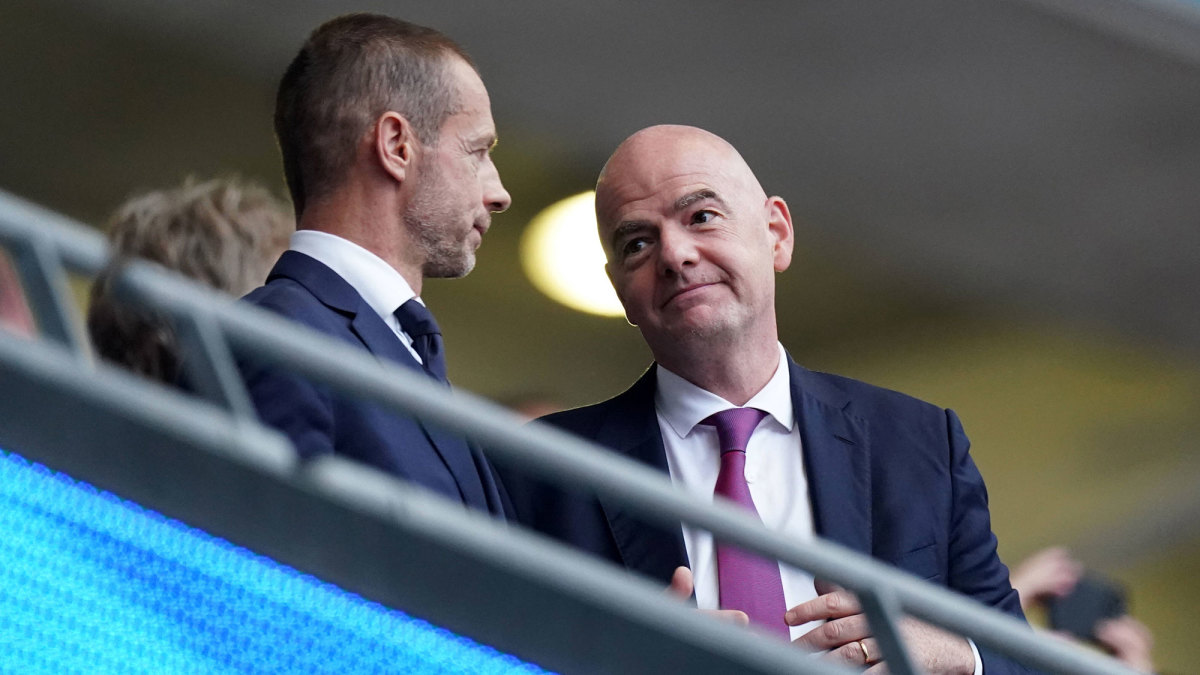UEFA, CONMEBOL Deepen Alliance in Resistance to FIFA
LONDON (AP) — In a small ground-floor office suite in London’s affluent Mayfair district, FIFA’s control over world football was eroded with a handshake and low-key unveiling.
The deeper alliance between the two most powerful football confederations from Europe and South America — by opening a joint office — comes just as FIFA President Gianni Infantino has been left chastened by the collapse of his pursuit of biennial World Cups.
The resistance to the attempt to double the frequency of FIFA’s showpiece events was led by UEFA President Aleksander Ceferin and CONMEBOL counterpart Alejandro Dominguez, who toasted their partnership with the office opening on Monday.
It is a joint base seemingly without any staff, established in time for the launch of a match which shows intercontinental competitions can be organized without any involvement from FIFA. The debut of the Finalissima — a clash of the European and South Americans champions — will see Italy and Argentina meet at Wembley Stadium in north London in June.
In speeches to the small gathered audience of European and South American national federation heads at their London office, Ceferin and Dominguez sought to emphasize this was not a collaboration with financial motivations.
“It is a historic day for football, for the world,” Dominguez said. “Not greedy. Not selfish. It is for the entire world. We are here to work for the good of the sport we love.”
It forms a closer bond between the only two continents to see its teams win the World Cup.
“It’s a great day for football,” Ceferin said, “When the only two winners of the World Cup meet it’s a big thing. I think Europe needs South America and South America needs Europe.”

Ceferin signaled a desire to use the partnership for the benefit of other confederations.
“We are not selfish,” Ceferin said. “This is for the development of all football. We are ready to cooperate with everyone. It is not against anyone. But we need this cooperation and I am looking forward to this great journey.”
The journey has already included UEFA and CONEMBOL both threatening boycotts of the World Cup if FIFA pushed ahead with an attempt to double the frequency of the tournament.
Having exhausted time and money into making the case for the plan, FIFA and Infantino are trying to disown the project and shift the responsibility on their members for backing a Saudi proposal for a feasibility study.
“FIFA has not proposed a biennial World Cup,” Infantino said at the FIFA Congress in Qatar last week, having previously talked up the idea.
“FIFA came to the conclusion that it is feasible, that it would have some repercussions and impacts,” he added. “But once this is certified, the next phase starts and it’s a phase of consultation, it’s the phase of discussion, it’s the phase of trying to find agreements and compromises.”
It was a climbdown after Infantino faced months of public rebukes from Ceferin and Dominguez over the threat to the status of their continental competitions, the damage to the women’s game and workload on players.
The formalization of the UEFA-CONMEBOL link-up does move the continents closer to organizing their own joint competition by expanding Europe’s Nations League to include South American teams.
Such a plan could grate other confederations, such as the body covering the North and Central America and Caribbean region.
CONCACAF President Victor Montagliani, who is keen on a Global Nations League that could feature his teams, has some issues with the power base being built by UEFA.
“If the game is really to be global, you can’t have a situation where they rebelled against a Super League in Europe, but it’s O.K. to have a super confederation,” Montagliani said on the sidelines of FIFA meetings and World Cup draw in Qatar last week. “What are the rest of us supposed to do? Just twiddle our thumbs and keeping sending players and capital over to Europe? That can’t happen. I’m sorry.”
Montagliani added that the fierce debates over biennial World Cups created a “disruptive situation” and a kind of divisiveness that can harm the sport.
“We need to have a hard look in the mirror as leaders of football,” Montagliani said. “I quite frankly think we’ve done a C if you had to grade us in terms of really coming together for for the sport.”
As for his solution: “Leave your ego at the door.”
The newest door to enter in world football politics is in the heart of central London, leading into the offices where UEFA and CONEMBOL believe they can reshape the game for the benefit of countries beyond their own continents.
Infantino didn’t make the trip to the London, opting instead to attend an event in Florence, Italy.
The Swiss-Italian is now counting down to his re-election as FIFA president that was launched last week after seeing his first seven years in power marked by divisions and aborted changes to competitions.
There was the attempt to cajole FIFA Council members into hastily accepting a $25 billion investment package to create new competitions that Ceferin successfully resisted. Then there was a failed attempt to fast-track the expansion of the World Cup from 32 to 48 teams in time for Qatar and spread the competition within the region.
“Listen, we all make mistakes,” Montagliani said. “Nobody’s perfect. Whether it’s me or whether it’s Gianni, whether it’s any other confederation president or, quite frankly, any president. We just need to get better because I think the sport deserves it.”
More Soccer Coverage:
